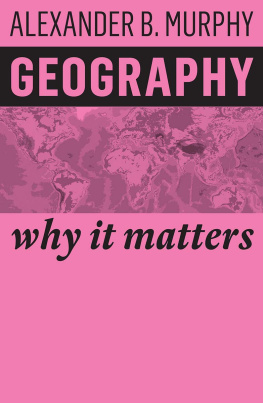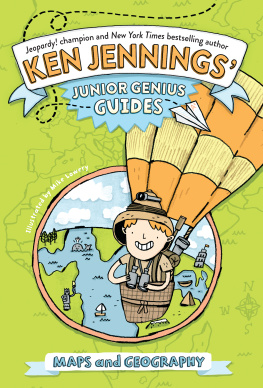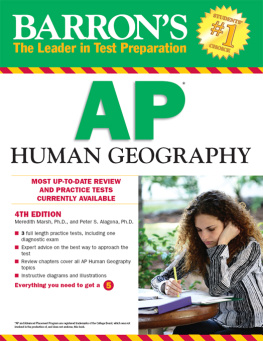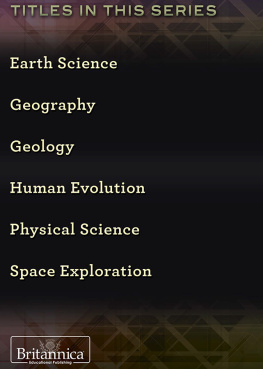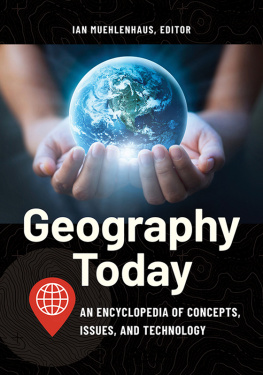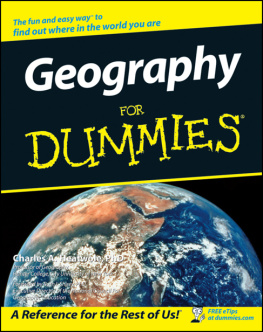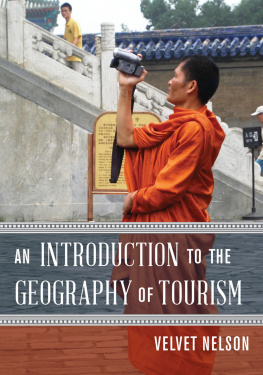Contents
Figures
Plates
Guide
Pages

Politys Why It Matters series
In these short and lively books, world-leading thinkers make the case for the importance of their subjects and aim to inspire a new generation of students.
Lynn Hunt, History
Tim Ingold, Anthropology
Neville Morley, Classics
Alexander B. Murphy, Geography
Geoffrey K. Pullum, Linguistics
Geography
Why It Matters
Alexander B. Murphy
polity
Copyright Alexander B. Murphy 2018
The right of Alexander B. Murphy to be identified as Author of this Work has been asserted in accordance with the UK Copyright, Designs and Patents Act 1988.
First published in 2018 by Polity Press
Polity Press
65 Bridge Street
Cambridge CB2 1UR, UK
Polity Press
101 Station Landing
Suite 300
Medford, MA 02155, USA
All rights reserved. Except for the quotation of short passages for the purpose of criticism and review, no part of this publication may be reproduced, stored in a retrieval system or transmitted, in any form or by any means, electronic, mechanical, photocopying, recording or otherwise, without the prior permission of the publisher.
ISBN-13: 978-1-5095-2304-7
A catalogue record for this book is available from the British Library.
The publisher has used its best endeavours to ensure that the URLs for external websites referred to in this book are correct and active at the time of going to press. However, the publisher has no responsibility for the websites and can make no guarantee that a site will remain live or that the content is or will remain appropriate.
Every effort has been made to trace all copyright holders, but if any have been inadvertently overlooked the publisher will be pleased to include any necessary credits in any subsequent reprint or edition.
For further information on Polity, visit our website: politybooks.com
For
R. Taggart Murphy
my brother, life-long supporter, and friend,
who has always encouraged me to think more deeply
about the world around us
Acknowledgments
The ideas set forth in this book first took root when I chaired a US National Research Council study outlining strategic directions for the geographical sciences. I am grateful to the other participants in that study for the many ideas and insights that made their way into the study report and into this book. A residency fellowship several years ago at the Rockefeller Foundations Bellagio Center gave me the opportunity to develop my thinking about geographys significance, and a return engagement in the summer of 2017 gave me the time to put together a first draft of this manuscript. On both occasions I benefited from the ideas and insights of my fellow Bellagio residents. It is no exaggeration to say that support from the Rockefeller Foundation was crucial to the completion of the project.
I am also grateful to many geography colleagues and students at the University of Oregon and beyond who shared ideas and suggestions. I am particularly indebted to Patrick Bartlein, Eve Vogel, Mark Fonstad, Jerilynn M Jackson, Daniel Gavin, Leslie McLees, Anna Moore, Craig Colton, Diana Liverman, Carlos Nobre, and David Kaplan. Dean Olson served as my research assistant as I finished up the manuscript; his input and help with research and figures were invaluable. I also thank my sister, Caroline Murphy, and my brother (to whom the book is dedicated) for insightful feedback on portions of the book.
The manuscript benefited greatly from the comments of two anonymous reviewers and from the helpful input of my editor, Pascal Porcheron. Finally, Susan Gary has been at my side throughout my work on this book and so much else through the years. My debt to her is beyond words.
Geographys Nature and Perspectives
Imagine that you could transport yourself back in time to the early 1960s and visit the Lake Chad region in Africa. You would find yourself wandering along the shores of one of the largest lakes in Africa a lake straddling the boundaries of four newly independent countries: Chad, Cameroon, Nigeria, and Niger. You would see a rich lakecentered ecosystem providing life-giving water and food for a few million people living near its shores. Most of the people you met would rely on the lakes abundant fish harvests, but you would notice farming and pastoralist communities as well. You might hear stories of tensions between different ethno-cultural groups, but not of armed conflict. During your explorations of the physical environment near the lake you would find significant woodland stands in some places, but sparser vegetation elsewhere because of the challenges presented by the long winter dry season. You might well be aware of the ecological fragility of the region, but you would be encouraged by an agreement entered into by the four states sharing the Lake Chad Basin setting forth a plan for cooperative management of the Basins development.
A visit today would be a very different experience. You would find a lake that has lost 90 percent of its 1960 surface area (), and a fish population that is a shadow of its former self. You would see a human population more than twice its 1960s size, but with abandoned villages in some areas and newly established makeshift settlements in others. As you wandered around you would encounter far fewer people making their living from fishing and far more from agriculture, and you would see evidence of major land-use conflicts resulting from the expansion of agriculture into pasture land. You would also likely be aware of deep tensions between the different states controlling parts of the Basin and indeed between state authorities and local peoples.
You would also see the impact of Boko Haram, a radical Jihadist insurgency movement that took root in northern Nigeria in the early 2000s and instigated an armed uprising aimed at establishing an Islamic state grounded on strict (many would say corrupt) Sharia law principles. Boko Harams advance into the Lake Chad region, and the military response of autocratic governmental authorities (often with support from the West), resulted in the displacement of well over two million people, the loss of thousands of lives to conflict and abduction, and a food crisis that has left some 20 percent of the people in the area facing acute malnutrition.
How can we understand what has happened to the Lake Chad Basin (LCB) or its relative invisibility in much of the wider world? (In late 2017 the New Yorker referred to the LCB as the site of the worlds most complex, troubling humanitarian disaster, yet outside the surrounding area and the confines of a handful of international aid organizations, few people know anything about it.) The situation is enormously complex. Long-term fluctuations in the size of Lake Chad are driven by natural forces, but its rapid shrinkage in the late twentieth century was also tied to the expansion of irrigated agriculture in response to population growth and a shift to larger-scale commercialized farming of export crops. Simultaneously, drought conditions have worsened in the face of a lethal combination of global climate change resulting from the burning of fossil fuels around the planet and air pollution emanating from Europe that has affected air circulation patterns. Moreover, decades of poor governance and economic marginalization have made it difficult for many of the inhabitants to respond to changing conditions and have helped pave the way for the rise of the Boko Haram movement, which itself grew out of a more widespread turn toward radicalism in Southwest Asia and North Africa in the early 2000s. All of this has unfolded against the backdrop of a wider world in which most of those living in better-off regions pay little attention to the Sahel a semi-arid zone of transition in Africa between the Sahara Desert and wetter regions to the south.

